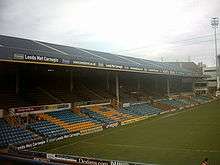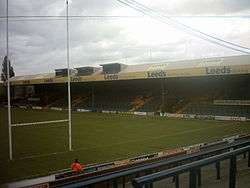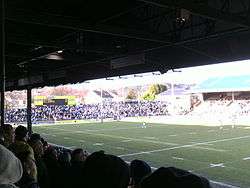Headingley Rugby Stadium
|
| |
| Location | Headingley, Leeds, England |
|---|---|
| Coordinates | 53°48′58.87″N 1°34′55.82″W / 53.8163528°N 1.5821722°W |
| Owner | Leeds Rugby |
| Capacity | 21,062[1] |
| Surface | Grass |
| Construction | |
| Opened | 1890 |
| Renovated | 1991, 2011 |
| Expanded | 1931, 1932, 2006 |
| Tenants | |
|
Yorkshire Carnegie (1991-present) | |
Headingley Rugby Stadium, often referred to as Headingley Carnegie Stadium or just Headingley shares the same site as Headingley Cricket Ground and is home to both of Leeds' rugby teams, Leeds Rhinos and Yorkshire Carnegie.
History
1889-1900s: Construction and early years
Leeds St. Johns, who were later to become Leeds Rugby League Football Club then Leeds Rhinos, moved to Headingley in 1889 and built Headingley stadium. Since then the stadium has staged more than 40 international matches and countless domestic finals. The ground now has a capacity of 21,000.[1] It is the second largest stadium in Leeds after Elland Road. Headingley hosted rugby league's first ever Challenge Cup final in 1897.
1930-1980: Expansions and World Cup games
In the 1930s, major developments took place on two sides of the rugby ground. The South Stand was completed in 1931, with some of the work being carried out by club players, while the old wooden North Stand was burned down during a match against Halifax on 25 March 1932. By the end of 1932, a new North Stand had been completed. The record attendance at Headingley was 40,175 for the rugby league match between Leeds and Bradford Northern on 21 May 1947. Undersoil heating was installed in 1963 but has since been removed due to ongoing problems, and floodlights were installed in 1966. The 1970 Rugby League World Cup Final between Great Britain and Australia was played at the stadium before a crowd of 18,776.
The third and deciding Test of the 1978 Ashes series was played at Headingley before a crowd of 30,604.
1990-2000: Leeds Rugby Union
New changing rooms were added in 1991, the same year Leeds RFU were founded and moved into Headingley.
Headingley only hosted one match of the 1995 Rugby League World Cup, held in England and Wales to celebrate the centenary of rugby league in England. Host nation England defeated rugby league minnows South Africa 46–0 in front of 14,041 fans.
In July 1998, Leeds RUFC became part of the world's first dual-code rugby partnership, Leeds Rugby Limited.
Two matches of the 2000 Rugby League World Cup were held at Headingley which included England v Fiji which England won by 66–10 in front of a crowd of 10,052 and latterly the quarter final fixture between England and Ireland which England won by 26–16 and attracted 15,405 spectators.
2001-2006: Major expansion and redevelopment
In 2001 capacity was increased marginally by extending the terracing around the corner in between the Western Terraces and the North Stand.
Since 2005 Headingley rugby stadium has been the venue for the annual varsity rugby union match between Leeds Beckett University and the University of Leeds which has attracted over 11,000 spectators.[2]
2006 saw the construction of the Carnegie Stand. Built to replace the old eastern terrace, it was opened on 1 September 2006 for the Super League match between Leeds Rhinos and Warrington Wolves. The building of this stand replaced the ageing executive facilities which were previously situated towards the rear of the Eastern Terraces.
2012-present: More international games
The 2012 World Club Challenge saw the first time that the stadium was fully packed to its capacity when the home team, and Super League XVI Champions, Leeds Rhinos took on the 2011 NRL winners the Manly-Warringah Sea Eagles. 21,062 turned out to see the Rhinos defeat Manly 26-12, the game being highlighted by Ryan Hall's 90 metre intercept try midway through the first half.[3] This saw Leeds gain some revenge for their 28-20 loss to Manly in the 2009 World Club Challenge at Elland Road.
The stadium hosted two matches of the 2013 Rugby League World Cup: a Group B game featuring New Zealand, the defending World Cup Champions, and Papua New Guinea on Friday 8 November which the Kiwis won 56–10 in front of an audience of 18,180. Headingley also hosted a Quarter-final game on Friday 15 November between New Zealand and Scotland which New Zealand won by 40–4 to a crowd of 16,207.
In 2015 Headingley hosted New Zealand again for the first time since 2013 where they took on Leeds Rhinos as a warm up for their test series against England. It also marked 120 years of rugby league being played at the stadium.
Layout
Paddock Stand

Capacity- 4,810 (seated)
The North Stand backs onto the cricket ground and is where the players changing rooms are. A bar area is also shared with the cricket ground and is completely covered.
Carnegie Stand

Capacity- 4,550 (1,844 seated)
The Carnegie Stand was completed in 2006 and replaced the Eastern Terrace. The stand has two tiers; the bottom contained terracing whilst the top contains seating, hospitality boxes, bars and a restrauant.
South Stand

Capacity- 6,000 (standing)
The South Stand is well known in rugby league for being the Kop of the ground. It contains only terrecing and holds the camera and media gantry. It also contains its own bar and bookmakers.
Western Terrace

Capacity-
The Western Terrece is the only part of the stadium not covered and houses the away fans. It also contains the scoreboard and Sky Sports video board.
Redevelopment
In 2015 it was announced that the North and South stands were to be rebuilt as part of the redevelopment of the stadium. The new North stand will include new changing rooms and hospitality for both the cricket and rugby ground, with the cricket side having two tiers. The South Stand will also be rebuilt as it was condemned in 2011 with plans since then to rebuild the stand. The new South stand will have the same standing capacity and will also house seating due to the North stand being slightly reduced and will have the same design as the Carnegie Stand.
The only side of the ground that has not been redeveloped or are there any plans to do so is the Western Terrace due to there being a public right of way and housing behind it. The biggest change to the Western Terrace is the permanent video board in the South West corner which replaced the temporary one in the North West corner.
Sponsors
| Year | Sponsor | Name |
|---|---|---|
| 2006- | Leeds Carnegie University | Headingley Carnegie Stadium |
Rugby league test matches
List of rugby league test matches played at Headingley.[4]
| Test# | Date | Result | Attendance |
|---|---|---|---|
| 1 | 25 January 1908 | | 8,182 |
| 2 | 21 October 1921 | | 31,700 |
| 3 | 15 January 1927 | | 6,000 |
| 4 | 9 November 1929 | | 31,402 |
| 5 | 11 November 1933 | | 29,618 |
| 6 | 16 October 1937 | | 31,949 |
| 7 | 17 May 1947 | | 20,000 |
| 8 | 4 October 1947 | | 28,445 |
| 9 | 9 October 1948 | | 36,529 |
| 10 | 15 December 1951 | | 18,649 |
| 11 | 4 October 1952 | | 34,505 |
| 12 | 25 October 1952 | | 10,380 |
| 13 | 17 December 1955 | | 10,438 |
| 14 | 26 January 1957 | | 20,221 |
| 15 | 14 March 1959 | | 21,948 |
| 16 | 21 November 1959 | | 30,301 |
| 17 | 30 September 1961 | | 16,540 |
| 18 | 17 November 1962 | | 11,099 |
| 19 | 30 November 1964 | | 20,497 |
| 20 | 21 October 1967 | | 22,293 |
| 21 | 18 October 1969 | | 8,355 |
| 22 | 24 February 1970 | | 9,393 |
| 23 | 6 November 1971 | | 5,479 |
| 24 | 24 November 1973 | | 16,674 |
| 25 | 12 November 1975 | | 7,680 |
| 26 | 29 January 1977 | | 6,472 |
| 27 | 18 November 1978 | | 30,604 |
| 28 | 21 February 1981 | | 3,229 |
| 29 | 18 November 1978 | | 17,318 |
| 30 | 17 February 1984 | | 7,646 |
| 31 | 1 March 1985 | | 6,491 |
| 32 | 6 February 1988 | | 7,007 |
| 33 | 29 October 1988 | | 12,409 |
| 34 | 7 April 1990 | | 6,554 |
| 35 | 16 February 1991 | | 5,284 |
| 36 | 2 April 1993 | | 8,196 |
| 37 | 6 November 1993 | | 15,139 |
| 38 | 9 November 2003 | | 2,124 |
| 39 | 22 October 2006 | | 5,547 |
| 40 | 22 October 2006 | | 5,547 |
| 41 | 22 June 2007 | | 12,685 |
Rugby League World Cup matches
List of Rugby League World Cup matches played at Headingley.[4] Results are from the 1960, 1970, 1985-88, 1995, 2000 and 2013
| WC Game | Date | Winners | Score | Runners up | Attendance |
|---|---|---|---|---|---|
| 1 | 21 October 1960 | | 21-15 | | 10,773 |
| 2 | 24 October 1970 | | 11-4 | | 15,169 |
| 3 | 7 November 1970 | | 12-7 | 18,776 | |
| 4 | 16 March 1975 | | 20-2 | 10,842 | |
| 5 | 9 November 1985 | | 6-6 | 22,209 | |
| 6 | 24 January 1988 | | 52-4 | 6,567 | |
| 7 | 14 October 1995 | | 46-0 | 14,041 | |
| 8 | October 1995 | | 26-16 | 15,405 | |
| 9 | 4 November 2000 | | 66-10 | 10,052 | |
| 10 | 8 November 2013 | | 56-10 | 18,180 | |
| 11 | 15 November 2013 | | 40-4 | 16,207 |
References
| Wikimedia Commons has media related to Headingley Stadium (rugby ground). |
- 1 2 "Rlfans.Com". Rlfans.Com. Retrieved 7 April 2013.
- ↑ LeedsVarsity.com retrieved 20 June 2014
- ↑ 2012 World Club Challenge at Rugby League Project
- 1 2 Headingley @ Rugby League Project
| Preceded by Sydney Cricket Ground 1968 |
Rugby League World Cup Final venue 1970 |
Succeeded by Stade de Gerland 1972 |
Coordinates: 53°49′01″N 1°34′56″W / 53.81694°N 1.58222°W